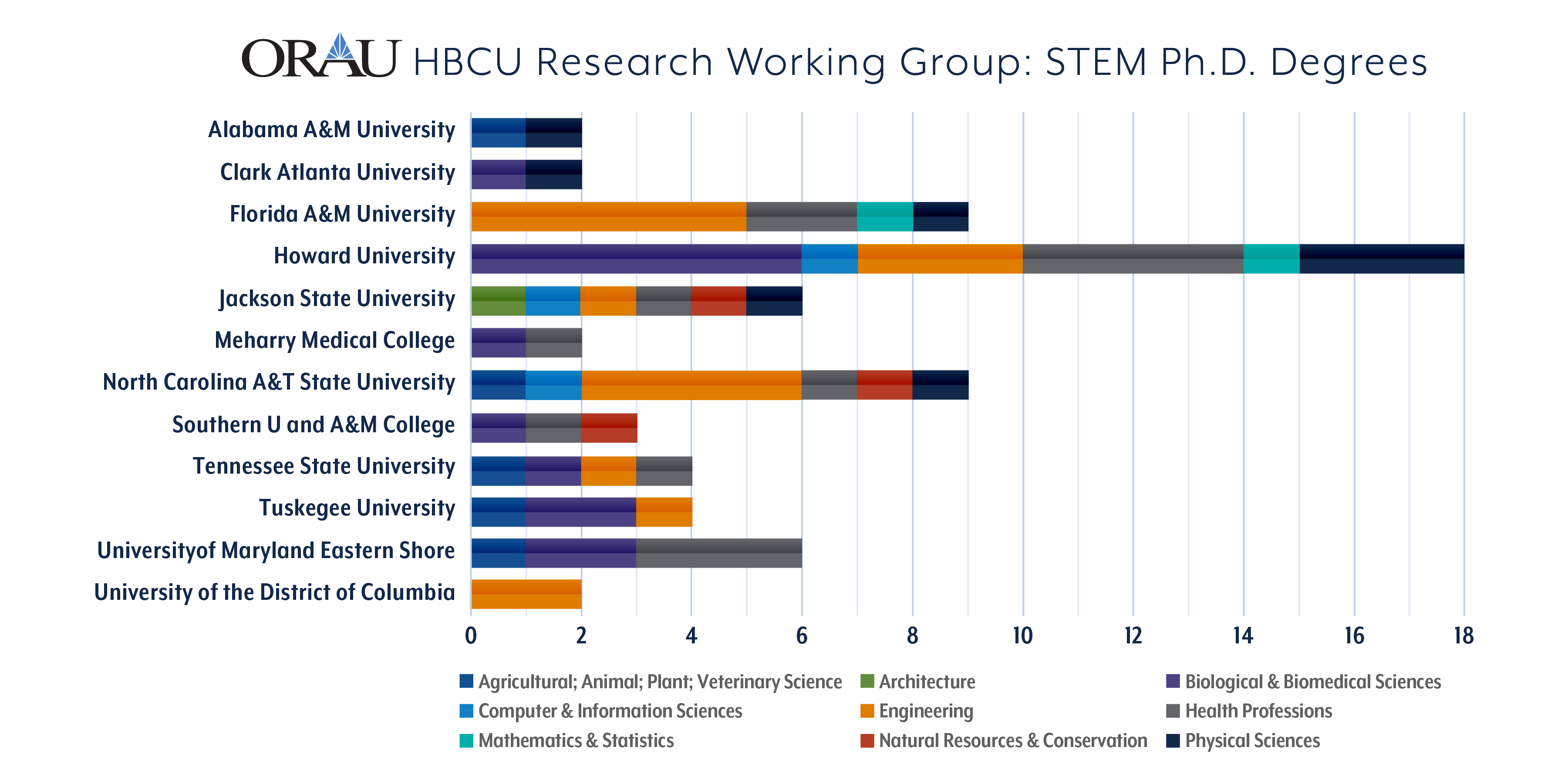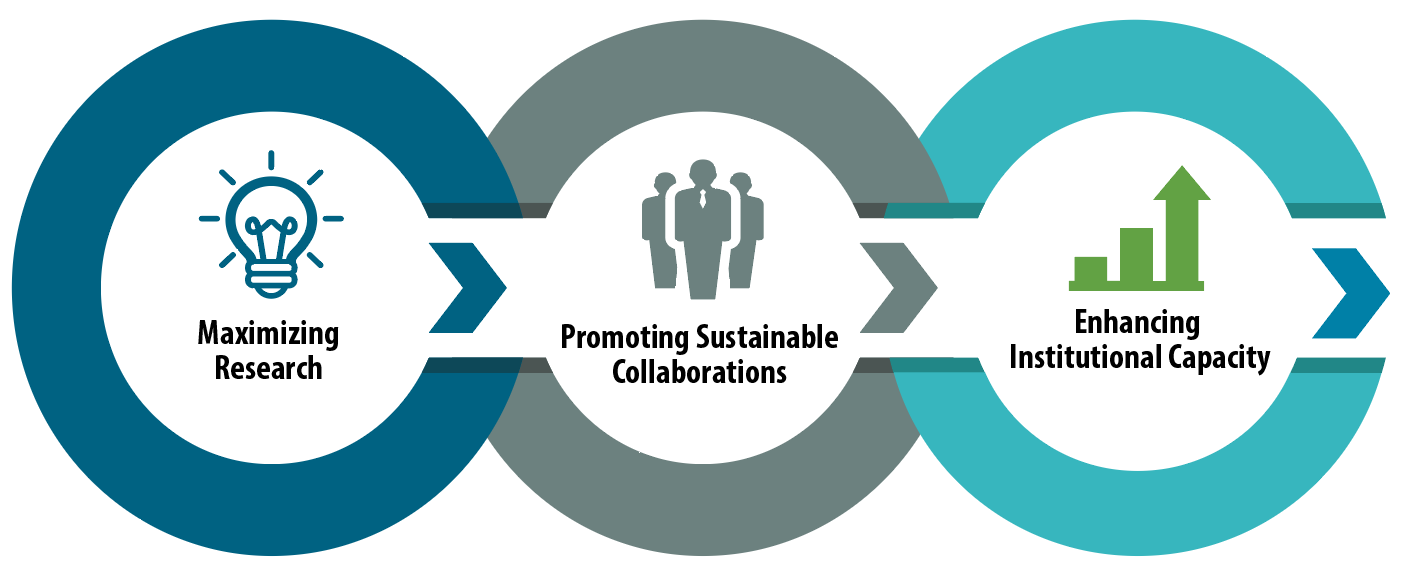Minority Serving Institutions
ORAU’s Research and University Partnerships Office (RUPO) actively works with its minority-serving member institutions to connect their expertise with government and private sector organizations and to create meaningful partnerships for innovation in scientific research and education.
Our university consortium consists of 48 Minority Serving Institutions (MSI): 17 Historically Black Colleges & Universities (HBCU), 15 Hispanic Serving Institutions (HSI), one Tribal College and University, 10 Asian American and Native American Pacific Islander-Serving Institutions (AANAPISI), and five with a dual designation of AANAPISI/HSI/Predominantly Black Institution (PBI).
| Institution | MSI Category |
|---|---|
| Alabama A&M University | HBCU |
| Arizona State University | HSI |
| CUNY City College (City College of New York) | AANAPISI, HSI |
| Clark Atlanta University | HBCU |
| Fayetteville State University | HBCU |
| Florida A&M University | HBCU |
| Florida Atlantic University | HSI |
| Florida International University | HSI |
| George Mason University | AANAPISI |
| Georgia State University | AANAPISI, PBI |
| Howard University | HBCU |
| Indiana University-Bloomington | HSI |
| Jackson State University | HBCU |
| Johnson C. Smith University | HBCU |
| Marymount University | HSI |
| Meharry Medical College | HBCU |
| Navajo Technical University | TCU |
| North Carolina A&T State University | HBCU |
| Portland State University | AANAPISI |
| South Carolina State University | HBCU |
| Southern University and A&M College | HBCU |
| Spelman College | HBCU |
| Tennessee State University | HBCU |
| Texas A&M University | HSI, AANAPISI |
| Texas A&M University-Kingsville | HSI |
| Texas Southern University | HBCU |
| Texas Tech University | HSI |
| Tuskegee University | HBCU |
| University of Arizona | HSI |
| University of California-Davis | AANAPISI |
| University of Central Florida | HSI |
| University of Colorado Denver Anschutz Medical Campus | AANAPISI |
| University of Houston | AANAPISI, HSI |
| University of Maryland-Baltimore County | AANAPISI |
| University of Maryland, Eastern Shore | HBCU |
| University of Massachusetts Lowell | AANAPISI |
| University of New Mexico | HSI |
| University of North Texas | HSI |
| University of Texas at Arlington | AANAPISI, HSI |
| University of Texas at Austin | AANAPISI, HSI |
| University of Texas at El Paso | HSI |
| University of Texas at San Antonio | HSI |
| University of Texas Permian Basin | HSI |
| University of Texas Rio Grande Valley | HSI |
| University of the District of Columbia | HBCU |
| Virginia Commonwealth University | AANAPISI |
| Virginia Tech | AANAPISI |
| Wayne State University | AANAPISI |
As with all members of ORAU’s university consortium, RUPO has a broad and deep knowledge of the capabilities and capacity of its MSI members, including specialized centers and institutes, and unique facilities and equipment. Our University Engagement Business Model serves as a proven, executable framework that leverages the science and technology expertise of ORAU’s growing community of universities. The model also includes the establishment of Basic Ordering Agreements (BOA), which serves as an efficient contracting vehicle for executing task orders.
As illustrated below, the MSI members have a broad range of Ph.D. degree programs across key STEM discipline areas.

Engaging our MSI members equally with all 160+ member institutions provides ORAU with a unique capability to bring forth a power house of subject matter experts across 37 states that represent a diverse set of thought leadership, perspectives and experience. Our team is on a mission to find new opportunities where our members work together to advance the nation’s science and technology agenda, and to provide a best practices framework that will serve as a model for establishing strategic, technology-focused partnerships.
 "The entire ORAU University Consortium is strengthened by the participation of its HBCU and MSI members who bring diverse and powerful perspectives, expertise and experience to the consortium. These partnerships provide unique access to a broad range of talent and helps broaden opportunities for underrepresented students and researchers across the STEM fields."
"The entire ORAU University Consortium is strengthened by the participation of its HBCU and MSI members who bring diverse and powerful perspectives, expertise and experience to the consortium. These partnerships provide unique access to a broad range of talent and helps broaden opportunities for underrepresented students and researchers across the STEM fields."
Rebekah Hersch, Ph.D.
Chair, ORAU Council of Sponsoring Institutions
Associate Vice President, Research Innovation
George Mason University
 "HBCUs and MSIs bring unparalleled diversity of thought, innovative research perspectives, and unique community engagement strategies to the ORAU member consortium. Their contributions are vital in driving equitable solutions, fostering inclusive excellence, and expanding opportunities for underrepresented groups across the STEM landscape."
"HBCUs and MSIs bring unparalleled diversity of thought, innovative research perspectives, and unique community engagement strategies to the ORAU member consortium. Their contributions are vital in driving equitable solutions, fostering inclusive excellence, and expanding opportunities for underrepresented groups across the STEM landscape."
Quincy A. Quick, Ph.D.
Vice Chair, ORAU Council of Sponsoring Institutions
Associate Vice President for Research and Sponsored Programs
Tennessee State University
HBCU Research Working Group
The HBCU Research Working Group is a subset of the university consortium and represents a premier group of 17 current and emerging research institutions engaged in leading-edge science and technology. Twelve of the HBCU members have STEM Ph.D. degrees across nine major research focus areas.

All of the HBCU members have recognized core facilities that provide a critical infrastructure for groundbreaking research. These facilities consist of specialized centers, institutes, and labs with high-end equipment that lead and support a diverse research portfolio—advanced manufacturing, climate change, health sciences, energy and sustainability, intelligent systems, materials science, modeling and simulation, national security, supply chain management—and more.
The overarching strategic goal is to collaboratively work on strengthening each other’s capacity to be recognized as competitive and strategic business partners with a mission of maximizing research, promoting sustainable collaborations, and enhancing institutional capacity.

Strategic goals to get there
- Establish research clusters to serve as a foundation for sustainable partnerships
- Create interdisciplinary research teams to pursue new research enterprises
- Expand access to opportunities for faculty and students to be engaged in national science research priorities
- Increase the number of advanced degrees in STEM disciplines for underrepresented populations
- Identify national and international markets that optimize the technical and scientific capabilities of all the participating institutions
- Pursue funding opportunities that support each institution’s capacity building and sustainability goals
Contact us
To learn more about ORAU's Minority Institutions, contact the University Partnerships office.